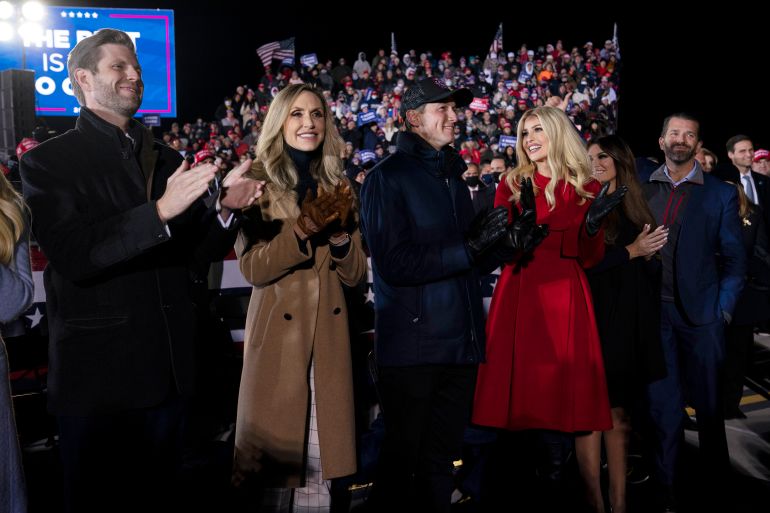Trump discussed pre-emptive pardons for family: Reports
The president is said to be worried about future investigations of his children and his son-in-law Jared Kushner.

US President Donald Trump is looking into granting pardons to his three eldest children, his son-in-law and his lawyer Rudy Giuliani, the New York Times and other US media have reported.
Trump is said to be worried that Joe Biden’s eventual attorney general will target Donald Trump Jr, Eric Trump, Ivanka Trump and her husband Jared Kushner, as well as Giuliani, and has discussed with his advisers granting pre-emptive pardons that would shield them from federal charges.
Keep reading
list of 3 itemsGeorgia election official urges Trump to rein in supporters
Barr: No fraud found that could change election outcome
Giuliani slammed the Times report after it was published using the Twitter hashtag, #FakeNews.
#FakeNews NYT lies again. Never had the discussion they falsely attribute to an anonymous source. Hard to keep up with all their lies.
— Rudy W. Giuliani (@RudyGiuliani) December 1, 2020
Conservative talk show host Sean Hannity, with whom Trump has a close relationship, brought the idea up on Monday saying: “The president out the door needs to pardon his whole family and himself because they want this witch hunt to go on in perpetuity, they’re so full of rage and insanity against the president.”
None of those being considered for pardons has been accused of or charged with federal crimes, so it is unclear how these specific pre-emptive pardons would work if Trump grants them.
Giuliani is currently under investigation by federal prosecutors for his role and the roles of two of his associates in trying to persuade Ukrainian government officials to help them dig up damaging information on Joe Biden and his son, Hunter.
What is clear is that presidential pardons only affect federal charges and sentences. Those receiving presidential pardons are not shielded from state and local investigations and charges. There is currently an investigation into Trump’s business by the Manhattan district attorney, which threatens to ensnare not only Trump but his daughter, Ivanka.
Pre-emptive presidential pardons have previously been granted in cases where the crime was clear but before somebody was charged. President Gerald Ford’s 1974 pardon of former President Richard Nixon for any crimes he “has committed or may have committed” as part of the Watergate scandal is the highest-profile example of a pre-emptive pardon.
There would be nothing illegal about Trump granting pardons to his family members. In 2001, just before leaving office, President Bill Clinton pardoned his brother, Roger, who was convicted on federal drug charges.
Meanwhile, the Reuters news agency has reported the US Justice Department is investigating a potential crime related to funnelling money to the White House in exchange for a presidential pardon, according to court documents unsealed in federal court.
US District Judge Beryl Howell on Tuesday released a heavily redacted order that described what she called a “bribery-for-pardon” investigation.
About half of the 18-page document was blacked out, with the publicly available version providing few details of the alleged scheme, and naming none of the people potentially involved.
A Justice Department official said no government official is or was a target of the investigation.
The document said federal prosecutors in Washington said they had obtained evidence of a bribery scheme in which someone “would offer a substantial political contribution in exchange for a presidential pardon or reprieve of sentence.”
Trump called reports of the “bribery-for-pardon” investigation “fake news”.
Pardon investigation is Fake News!
— Donald J. Trump (@realDonaldTrump) December 2, 2020
Last week, Trump pardoned his former national security adviser, Michael Flynn, who had twice pleaded guilty to lying to the FBI during the investigation into Russia’s interference in the 2016 presidential election. The Flynn pardon was the first in what is expected to be a flurry of pardons in Trump’s final days. His term ends on January 20, 2021.
